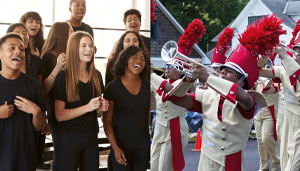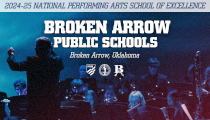Keeping Up Your Craft: The Benefits of Ensemble Performance for Conductors
By Michael McCormick on May 16, 2023 advocacy PrintMany music teachers do some form of teaching outside of their classroom. Teachers will often direct shows out in the community, perhaps direct a community or church choir, lead a local band or orchestra, or teach lessons on the side. It can be incredibly important, both for financial stability and personal enjoyment, to teach music outside of your own classroom. But I propose that we as teachers of music should also be on the receiving end of musical direction. Perhaps instead of exclusively leading all these other ensembles, we should “practice what we preach” and go sing in those choirs, play in those bands and orchestras, and perform on stage in those shows. There are an infinite number of benefits to being on the other side of the baton.
1. New Rehearsal Strategies
I suppose the most obvious reason for being a member of an ensemble is to see and learn rehearsal techniques from another conductor. I absolutely love attending interest sessions and workshops, but they are typically a one-and-done experience that are oftentimes surrounded by several other workshops. Even with writing copious notes, it can be hard to remember everything that the clinician offered in their session. Although, sitting in a weekly rehearsal, you get to see another conductor teach with a particular method on a regular basis. This not only allows you to learn new techniques, but you can see them in action and know their lasting impact on the ensemble.
2. New Repertoire
I am someone that absolutely loves going to reading sessions at conferences and getting free pieces of music. But, I can count on one hand the number of times I actually programmed a piece that I heard at a reading session. Reading sessions just don’t give us enough time to appreciate the nuances and subtleties of a piece. Although, if we are performing in an ensemble, we get to work on an entire concert program for weeks or months. This gives us time to dive deep into the music and make an informed decision on whether or not it would be a good piece for our own ensembles.
3. Remember Frustrating Experiences
We are all familiar with getting frustrated in leading an ensemble. Maybe you’re having trouble getting a chord tuned correctly, a tricky rhythm is taking too long to nail down, or the balance just doesn’t sit the right way, but do you remember what it feels like to be IN the ensemble when those things happen? If you don’t, it can be difficult to relate to how students can feel defeated, frustrated, or even angry when things aren’t going well in a rehearsal. Similarly, we may not remember what things bother us that conductors do. For example, I have always despised when a conductor says “one more time” when it really means “one more time...unless I change my mind.” Because of this, I try to avoid saying it to my ensembles as much as possible. Maybe there are some things that you do in rehearsal that you simply forgot were annoying because you haven’t experienced them in quite some time.
4. Show Your Love for Ensembles
Your students will appreciate knowing you also enjoy being IN an ensemble and not just in front of one. By being in an ensemble, we can show our students that we too are learning, practicing, and performing the craft that we are teaching. If you don’t show you enjoy singing in a choir or playing in an orchestra, why should your students enjoy it? And beside that, students get excited to see your performances! I am constantly having students inquire about the concerts I sing in, and they are always so delighted to hear recordings and see videos of my other choirs.
5. Networking
By performing in a community based or professional ensemble, you get to meet people from all walks of life. From professionals working in non-music fields, to other music teachers and plenty of professional musicians that perform very regularly. You can call on those fellow music teachers to organize collaborations with other schools/groups. Professional musicians could come to your ensembles and give masterclasses, do workshops, or be a resource for private lessons. And those ensemble members that work in other fields can offer assistance in teaching your students how you can combine their love of music while pursuing another career. Performing in an ensemble brings new friendships, connections, and mentors that can last a lifetime.
If you have ever thought about joining an ensemble since beginning your teaching career, I highly recommend it. There are plenty of options ranging from ensembles that rehearse every week all year long, to some ensembles rehearsing on a per-project basis. Even if you only participate in an ensemble for a portion of the year, or once every couple of years, it can bring a number of benefits to your teaching. Go out and find an ensemble today!
Michael McCormick
This article first appeared in NJMEA’s TEMPO Magazine, October 2021 edition. The goal of the New Jersey Music Educators Association is to advance music instruction in New Jersey’s educational institutions at all levels that provide in-service and enrichment opportunities for practicing and retired teachers and prospective music educators, as well as sponsoring various festivals and all-state performing groups for K-12 students. Check out the New Jersey Music Educators Association here: (https://njmea.org/)
Most Recent Articles







